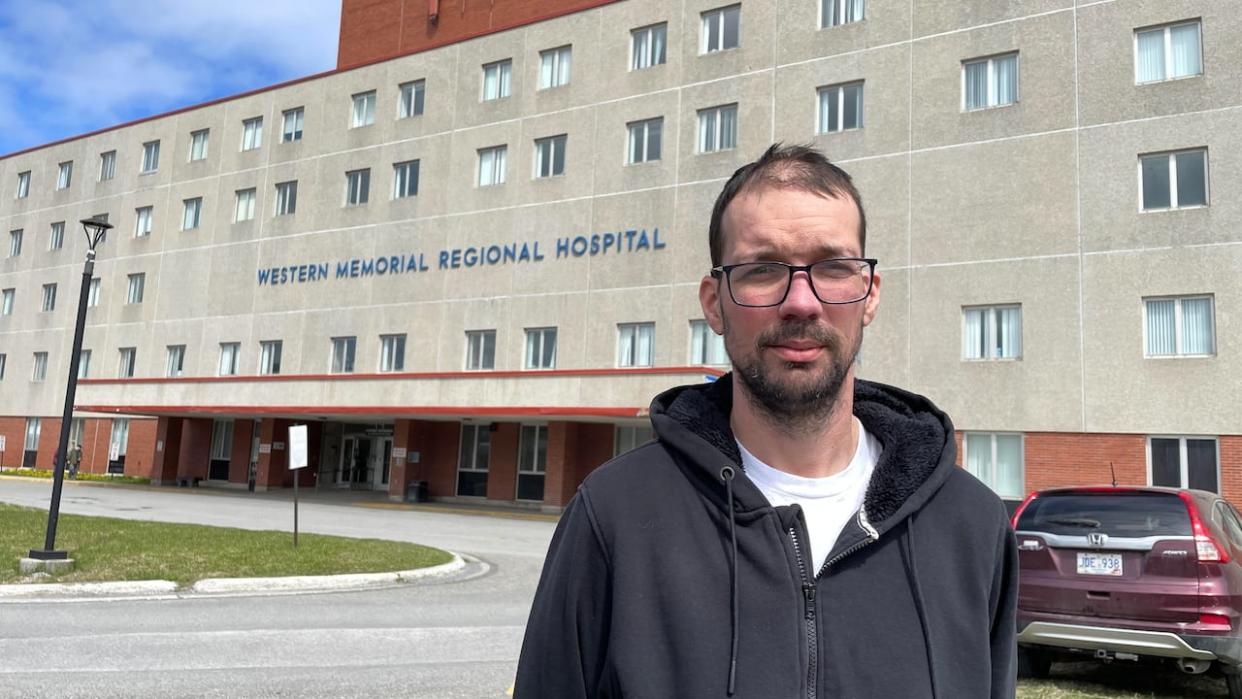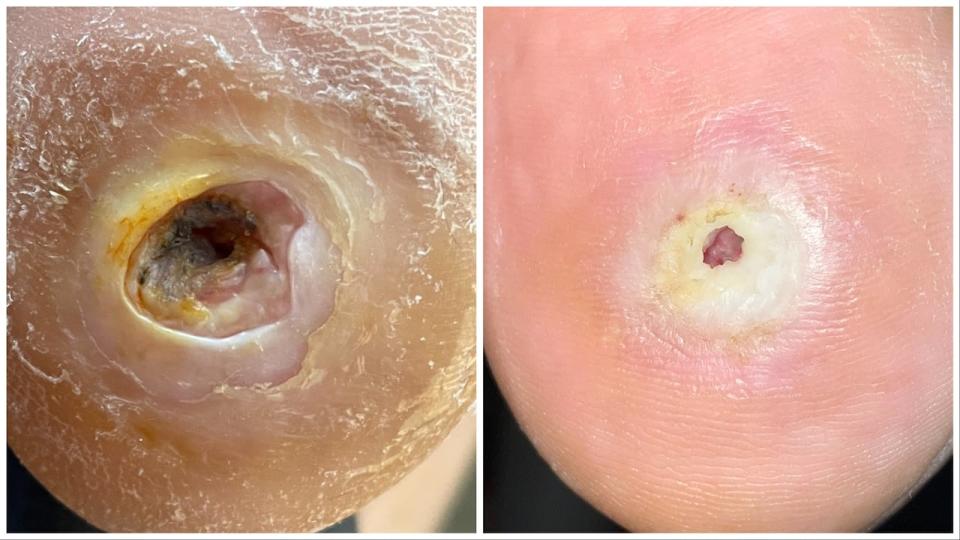Amputation fears paramount for Corner Brook man as wound care clinic closes


Jeffery Stone says he was in a hospital waiting room for a scheduled appointment on May 2 when he was informed that the wound care clinic was closed until further notice. (Submitted by Catherine Verge-Stone)
A Western Newfoundland man is worried that the closure of the region's only specialized wound care clinic will have a devastating effect on him, as well as other patients in his position.
Jeffery Stone has diabetes and has a diabetic ulcer on the bottom of the heel of his foot. The wound has been treated for more than a year now at the wound care clinic at Western Memorial Regional Hospital, and it's slowly been improving, thanks to the care he's received from the specially-trained nurse practitioner at the clinic.
But that medical professional — the sole staff person at the clinic — isn't working at the moment, leading to the clinic shutting down without any notice being given to patients like Stone. In fact, Stone said he was in a hospital waiting room on May 2 for his regular appointment when a staff person informed him that the clinic is closed until further notice.
"It infuriates me," said Stone, who wants the clinic to reopen.
"I'd like to see the nurse practitioner return and possibly another nurse with her to help to alleviate the load," he said.
N.L. Health Services confirms that the clinic has closed due to an unexpected vacancy.
Stone said more needs to be done to try to retain the nurse practitioner who was in the position, who he feels has been overworked.
Deep wound
Stone, 42, who has had Type 1 diabetes from early childhood, has relied on the regional wound care clinic for more than a year. A small sore on the bottom of his foot worsened to the point of being a deep wound nearly down to the bone.
Diabetes makes it more difficult for healing to take place. Stone said the ulcer on his heel was at one point more than a centimetre in diameter and more than a centimetre deep.
"It is healing and getting smaller, but that's due mostly to the care that I've been receiving at the wound care clinic," said Stone.
Stone hasn't been able to continue his work as a mechanic at a car dealership because he has to keep pressure off his heel as much as possible.

Jeffery Stone has had a diabetic ulcer on the bottom of one of his feet for more than a year. The wound has considerably, as the photo to the right shows, as a result of ongoing treatment by a nurse practitioner at the wound care clinic at Western Memorial Regional Hospital in Corner Brook. (Submitted by Catherine Verge-Stone)
Stone said promoting healing has been a painstaking process, with daily care by his wife in changing dressings, as well as treatment at the wound care clinic every week or two, and sometimes twice a week at the outset.
On his visits to the clinic, Stone said the wound care specialist did debridements, to cut away a callus and remove other non-viable tissue from the wound, to promote healing and restoration of healthy tissue.
He's also been treated with months of intravenous antibiotics to fight off infection.
Stone said he's personally experienced the benefit of being cared for by someone with specialized training in wound care.
Now, he's worried that all the progress that's been made could easily be undone, as the care he's received is no longer available.
Stone said he believes that the lack of wound care for the many patients he's met at the clinic could lead to amputations for some.
He said he's been told that, if the wound he has doesn't heal, amputation would be the only other option. Losing a foot is a frightening prospect for Stone.
He said it seems obvious to him that investing in wound care has the potential to save limbs and, in turn, to save the health care system a lot of money.
"This is a preventive service and it's currently not being provided," said Stone.
"In my opinion, it would cost less for them to have this nurse practitioner and another nurse there than it would to have surgeons removing limbs, hospital stays, prosthetics, like just rehabilitation and physiotherapy and stuff," he said.
Short-term solution
Newfoundland and Labrador Health Services declined CBC's request for an interview about the wound care clinic.
In an email, spokesperson Tara Pye said the health authority is working to fill the unexpected vacancy that led to the shutdown of the wound care clinic.
In the meantime, Pye said that staff have contacted patients who were being treated at the wound care clinic to discuss their plan of care.
N.L. Health Services said it's "exploring alternative short-term options such as linking patients with other health-care providers who could support care."
Consistent with that statement, Stone said that, on Thursday — a week after the clinic closed, and after days of phone calls and visits to the hospital to seek answers — he had a call from the health authority to inform him that a different nurse at a different clinic will take him on as a patient.
He said that's a help to him personally, but not the same as having the wound care clinic re-opened for the benefit of all patients who need it.
Download our free CBC News app to sign up for push alerts for CBC Newfoundland and Labrador. Click here to visit our landing page.


